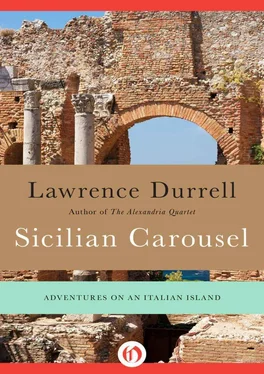I walked a bit and ate in a trattoria and then went straight to bed with a couple of paperbacks I had found in a kiosk. I was surprised to find how well Sartre came over in English and what an accomplished novelist he was. But I slept ill. I resorted to Mogadon to help — breaking my promise to myself.
Meanwhile Beddoes, who never seemed to go to bed, played his eternal pool in the bar and Deeds drank a quiet whisky and pondered the cricket scores in a brand new Times he had found in a waterfront kiosk. It was now the turn of Miss Lobb to produce an unusual reaction to circumstance. She had been very quiet all day, indeed rather sleepy. Now, seated in a dark corner of the bar not too far from Deeds she began to drink in a slow but extremely purposeful way — gin and soda, one following hard upon another. Gradually her quiet concentration forced itself upon the attention of Deeds who saw, to his astonishment, that Miss Lobb was showing signs of getting steadily drunker as glass succeeded glass. He felt alarm and concern, but after all her life was as much her own as her bank balance. What could he do, after all? Perhaps she had, in the course of a long bar life, contracted a touch of that blissful alcoholism which makes all the difference between despair and muddled indifference? Perhaps there was some past experience which ached her? Deeds felt sympathy and deep respect for Miss Lobb — who did not? But on she went.
He continued his careful analysis of the psychological weaknesses of the Hampshire eleven, and it was about eleven when he looked up to see that Miss Lobb’s eyes were swimming in tears. She was not actually sobbing or sniffing but, as if from some invisible fountain inside her, tears just welled out and rolled down her cheeks. Deeds felt acute embarrassment, which was succeeded by anxiety as he saw her rise and slowly cross the hall towards the front door of the hotel. Surely she was not going out into the streets like that? She walked with a certain slow majesty which some people would say was the authentic Dublin glide — just a hint of being on castors, propelled by dark interior forces. It was rather a dilemma for a quixotic Englishman; after all, if the girl had trotted off in search of adventure surely he could not intervene. On the other hand if she got into trouble…. A perplexed Deeds pocketed his Times and set off in tactful pursuit of the lady, keeping a fair distance behind her and not in any way trying to bring himself to her attention. It was rather like following a sleepwalker about. But he felt his position acutely — after all he did not know her very well. She was simply a traveling companion. But on the other hand he could not bear the thought that she might by some accident of hazard find herself in a situation where she needed help. He followed.
Miss Lobb walked absently along the sea front for a while, apparently having decided to let the sea wind sober her up a little; but from the occasional glimpse Deeds caught of her face it seemed that her tears still flowed. She turned into the side streets and walked along the sides of a rectangle in order to emerge once more on the sea front which was not completely empty of life at that hour. There were a few rather undesirable-looking youths about and Miss Lobb appeared to wake up to the fact for she suddenly turned round, as if to return to the hotel, and found herself face to face with Deeds. She smiled at him and said: “O I am so glad to see you,” which at once set Deeds’s doubts at rest concerning his appropriateness on the scene. She now relaxed and settled upon a bench with an air of sleepy devoutness, and after a moment’s hesitation he sat beside her and put his arm through hers, a gesture which she appeared to find reassuring. “It’s this damned old anniversary of my mother’s death,” she explained at last, drying her tears in a pocket-handkerchief. “It always catches me, and I get the migraine.” She was in a sodden depression but not drunk, and Deeds, after showing an appropriate sympathy which was not unfeigned — and which contained a good portion of relief that she was in her right mind — suggested the only sort of therapy suitable for such cases, such circumstances, such moods. “We must walk it off,” he said briskly, glad to have such a simple solution at hand. So walk they did.
All this of course he described to me on the morrow over a late breakfast, and I envied him the experience. They had walked half the night, in fact, and in fairyland. The sea front was more or less folded up and deserted but as they advanced upon the interior of the town they came to the margins of the darkness, and saw everywhere lights budding and springing up. It was an inferno of activity, and they realized that they were intruding upon the preparations for a great fête — in fact the name day of Palermo’s patron saint, Saint Rosalie. Half the great city was still alive and awake, for apart from the numerous artisans who were busy arranging the decorations the streets were full of wide-eyed onlookers and curious children. The crowds walked up and down in this atmosphere of impromptu kermess, watching the colored awnings going up, the electric light fixtures being set and tried out, watching the Catherine wheels and other fireworks being settled on their pinions. And tall as giraffes, moved the three-storey trolleys normally used to change the municipal electric light bulbs but now pressed into service to string out rolls and rolls of colored bunting across the streets. Children were bathing in the fountains, infected by all this blazing light and excitement. A whole market garden of flowers had sprung up in one quarter which they doused down with water every few minutes. It gave off a smell of wet earth like paradise. No wonder the hotels were short of bathwater! Livestock too was coming into town in lorries and being planked down beneath the booths and stalls; pigeons, ducks, quail and chickens, and morbidly sensitive rabbits! Miss Lobb thought herself in Paradise, and she was sad to think that she could not at that late hour buy a rabbit or a pot of basil. But the stress of the alcohol was diminishing now, and it was clear that by the time they regained the hotel she would be all right again. Deeds, combining therapy with culture, told her the story of Saint Rosalie.
Walking lightly thus, arm in friendly arm, they joined themselves to the dense groups of curious promenaders, who had turned the principal streets into an impromptu midnight Corso. The crowd swayed and swelled, ebbed this way and that, just like batches of seaweed in a sea grotto. It was quite simply bliss, and the history of Rosalie gave a kind of folklorique color to all that was going on round them. Deeds, who had had a lot of practice telling stories to his own children, found no difficulty in enlisting Miss Lobb’s tenderest feelings on behalf of this little fifteen-year-old niece of William the Good who was so overcome by feelings of sanctity that she disappeared from the face of the earth — translated, some say, by angels direct to heaven. In fact, she had retired to a hermit’s cave on Monte Pellegrino, there to pass a long life of anonymity, and finally there to die without letting anybody know what she had done. This was in 1159. The long silence fell and she was forgotten, all trace of her was lost. Then in 1624 while the town was in the dread grip of the plague, a holy man was troubled by a dream of her. He dreamed her history, and quite clearly saw in a vision that her remains lay buried in a mountain cave — he could indicate the exact spot. He suggested to the proper authorities that if these relics, which had in the interval acquired great magical powers of healing, were reverently gathered and carried in triumphal procession round the walls of the city, there was a sporting chance that the plague would abate.
Читать дальше











